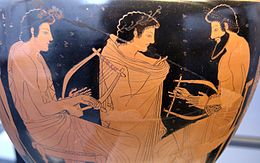
Back ما بعد الرومانسية Arabic Postromanticisme Catalan Spätromantik German Post-romanticism English Malfruromantikismo EO Posromanticismo Spanish Hilisromantism ET Post-romantisme French Постромантизм Russian 后浪漫主义 Chinese
Il postromanticismo[1] si riferisce a una serie di tentativi e atteggiamenti culturali che emergono tra la fine del diciannovesimo e l'inizio del ventesimo secolo, dopo il periodo del romanticismo.
Herman Melville e Thomas Carlyle sono scrittori postromantici.[2] Madame Bovary di Flaubert è un romanzo postromantico.[3] Il periodo del postromanticismo in poesia è definito come la fine del diciannovesimo secolo, ma comprende la poesia di Letitia Elizabeth Landon[4] e Tennyson.[5]
- ^ postromantico, in Treccani.it – Vocabolario Treccani on line, Roma, Istituto dell'Enciclopedia Italiana.
- ^ Robert Milder, Exiled Royalties: Melville and the Life We Imagine, New York: Oxford University Press US, 2006, p. 41. ISBN 0-19-514232-2
- ^ Stephen Heath, Gustave Flaubert, Madame Bovary, Cambridge and New York: Cambridge University Press, 1992, p. 13. ISBN 0-521-31483-6.
- ^ Sybille Baumback and others, "A History of British Poetry", Trier: WVT. ISBN 978-3-86821-578-6. Section 19: Poetic Genres in the Victorian Age I: Letitia Elizabeth Landon’s and Alfred Lord Tennyson’s Post-Romantic Verse Narratives by Anne-Julia Zwierlein.
- ^ Richard Bradford, A Linguistic History of English Poetry, New York: Routledge, 1993, p. 134. ISBN 0-415-07057-0.
